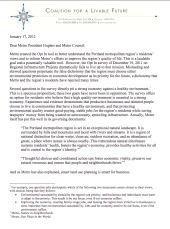
A survey created by Metro and sent to their nearly 10,000 member Opt In Panel last month has drawn the ire of non-profits, local business owners, and citizen advocates — 26 of whom have signed onto a letter outlining their concerns that was sent to Metro President Tom Hughes and members of the Metro Council today.
When the survey was released at the end of December, we shared the negative reactions it received from many in the local transportation advocacy world. Many who took the survey, myself included, cringed at the content and framing of several of the questions.
The letter, coordinated by Coalition for a Livable Future (CLF) urges Metro to “disavow” the “flawed” survey. Adding strength to the concerns are 18 businesses and nonprofit organizations and 8 individuals who signed onto the letter (all of whom are usually Metro allies). The signatories include: Ron Carley, CLF’s Executive Director; Mary Kyle McCurdy, Policy Director, 1000 Friends of Oregon; Jim Labbe, Urban Conservationist Audubon Society of Portland; Gerik Kransky, Advocacy Director, Bicycle Transportation Alliance; Caitlin Baggott, Executive Director, The Bus Project; Chris Hagerbaumer, Deputy Director, Oregon Environmental Council; Mike Houck, Director Urban Greenspaces Institute; Steph Routh, Executive Director, Willamette Pedestrian Coalition; economist Joe Cortright, and others.
“Misleading and skewed questions perpetuate the false dichotomy that the region must choose either environmental protection or economic development as its priority for the future, a dichotomy that Metro and the region’s residents have rejected many times.”
— From the letter
Here are some excerpts from the letter (available as PDF here):
“Misleading and skewed questions perpetuate the false dichotomy that the region must choose either environmental protection or economic development as its priority for the future, a dichotomy that Metro and the region’s residents have rejected many times…
Several questions in the survey directly pit a strong economy against a healthy environment. This is a specious proposition; these two goals have never been in opposition. The survey offers no option for residents who believe that a high quality environment is essential to a strong economy. Experience and evidence demonstrate that productive businesses and talented people choose to live in communities that have a healthy environment, and that protecting environmental quality creates good-paying, stable jobs for the region’s residents while saving taxpayers’ money from being wasted on unnecessary, sprawling infrastructure.
…
The questions on regional infrastructure funding priorities and the Columbia River Crossing also require numerous false choices and read like a push poll. A question on regional transportation funding priorities forces readers to indicate which transportation mode they do not support “at all,” creating an unnecessary “us vs. them” dynamic between transportation modes. This “choice” eliminates the possibility for residents to indicate they believe the region should pursue a multimodal, balanced approach to meeting its mobility needs…”
…
By implying –with no basis in fact–that jobs and environmental quality are mutually exclusive goals, the Metro Opt-In poll transforms what could be useful opinion research into research that yields meaningless and misleading results.
If any metropolitan region can demonstrate to the nation and the world that economic development, environmental protection, and equity are mutually accomplishable goals, the Portland region can, and should.
The letter calls on Metro to not only “disavow this flawed Opt In survey” but also to “affirm its commitment” to a healthy environment and vibrant economy.
When asked about the survey last month, Metro’s Director of Communications, Jim Middaugh acknowledged they were “attempting to provoke a bit” and said the forced-choice style of questioning was an attempt to “get at underlying values.”
Download a PDF of the letter here.

